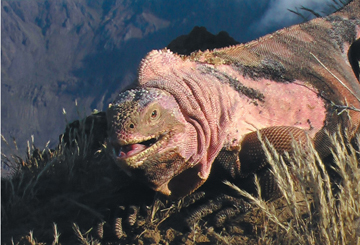|
|
A newly identified, but already endangered species of pink land iguana may provide evidence of the lizard’s evolution on the Galápagos Islands, report researchers writing in the Proceedings of the National Academy of Sciences.
Genetic analysis of the “rosada” iguana by Gabriele Gentile and colleagues shows that the species diverged from its iguana ancestor more than five million years ago, making it one of the oldest known examples of diversification on the fabled island chain where Charles Darwin collected much of the evidence — mostly among finches — to support his theory of evolution through natural selection.
 Pink iguana. Photo courtesy of Gentile et al. |
“So far, this species is the only evidence of ancient diversification along the Galápagos land iguana lineage and documents one of the oldest events of divergence ever recorded in the Galápagos,” write the authors, who note that the species emerged as the remote equatorial archipelago was still forming.
The rosada iguana — which was first spotted in 1986 — is so rare it is at risk of extinction. This status, coupled with its evolutionary importance, makes the species a top conservation priority write the researchers.
“These findings call for a conservation program aimed at evaluating the risk of extinction of this newly recognized species, which, based on currently available data, would be assignable to
the ‘critically endangered’ category by meeting criteria B and C of the International Union for Conservation of Nature (IUCN) Red List.”
CITATION: Gabriele Gentile, Anna Fabiani, Cruz Marquez, Howard Snell, Heidi Snell, Washington Tapia, and Valerio Sbordoni. “An overlooked, pink, new species of land iguana in the Galápagos,” PNAS for the week of Jan 5, 2009.